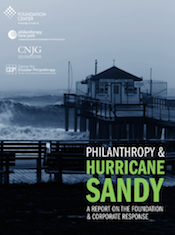Site Search
- resource provided by the Forum Network Knowledgebase.
Search Tip: Search with " " to find exact matches.
This publication from Grantmakers for Effective Organizations offers a framework for thinking about how to measure progress and results in place-based and community change initiatives.
Nonprofit Finance Fund's Annual Survey chronicles the challenges facing the nonprofit sector and calls out some of the targeted investments we can start to agree on as a society to salvage the investment we have collectively made in our social infrastructure. We believe that a coordinated intervention now will not only better prepare us for inevitable future economic crises; it can lead to a happier, healthier community for us all.
CNJG’s community foundation services (through the United Philanthropy Forum) breakdown into three categories:
1. a national listserv for CEOs
2. two in-person boot camp trainings
3. discount on the On-Line CF Express Training
National Listserv for Community Foundation CEOs
CNJG’s listserve for Community Foundation CEOs connects to a national listserv for the CEOs of community foundations. This active listserve allows community foundation CEOs to communicate easily via email with community foundation CEOs from across the country, to pose questions, engage in conversations and more. The service is being made available to our community foundations members as a benefit of your membership with CNJG and is operated by the Untied Philanthropy Forum, which is CNJG’s national network.
If you are interested in participating in this national community foundation listserve, please contact Craig Weinrich.
Community Foundation Boot Camps
The United Philanthropy Forum offers two or more Community Foundation Boot Camps a year that are made available to CNJG members at the member rate as a benefit of CNJG membership. The two-day Community Foundation Boot Camp program offers a comprehensive overview of the structure and operations of a community foundation. The program is an ideal in-depth introduction to community foundations for new community foundation staff, community foundation board members, or more experienced community foundation staff looking for a good refresher.
On-Line CF Express Training
The Forum is partnering with Kansas Association of Community Foundations (KACF) to offer a $400 discount on KACF’s On-Line CF Express Training. The online training and certificate program focuses on core essentials over a 15-module series that covers nearly every aspect of community foundation work: from asset development and quality grants programs design to fiduciary and policy matters. Plus, enjoy 24-hour-access to the easy-to-navigate short (5-15 min) modules in any order from the comfort of a home or an office, in private, or as a group training.
Watch the CF Express Training Promo Video and view a sample module (password: mod15) to learn more. To take advantage of the discount, sign-up at https://cfexpresstraining.com and enter discount code: Forum2018. You can also reference the following attachments for more details.

This new report from CNJG and partners examines the response of foundations, corporations, and other institutional donors to the devastation wrought by Hurricane Sandy in October 2012. Numbering nearly 600, these funders have so far committed more than $380 million for relief, recovery and building efforts. The hard data and reflective observations in the report contribute to the growing body of knowledge that helps foundations and corporations be strategic and effective with their giving when disaster strikes.
Two years after the historic storm, Philanthropy & Hurricane Sandy: A Report on the Foundation & Corporate Response breaks down the allocation of dollars contributed thus far and offers perspective on the role of private giving in disaster response and lessons to be taken from this one. The report was published by the Foundation Center in partnership with the Council of New Jersey Grantmakers and Philanthropy New York, and with support from the Center for Disaster Philanthropy.
“Throughout the past two years, our exceptional nonprofit and funder community has taken on challenges they never imagined,” said Nina Stack, president of the Council of New Jersey Grantmakers. “These organizations continue to develop innovative solutions that other communities will learn from and build upon in future disasters.”
In addition to the report’s numerous funders, CNJG wishes to thank the PSEG Foundation for supporting this project.
You will have an opportunity to learn about the collaborative process that resulted in this first version of the framework. In addition, you will hear from peers and practitioners who contributed to the development of the framework. Don't miss this opportunity to gain a deeper understanding of the framework's design principles and how they foster equity, transparency, and responsible AI adoption.
Speakers
Jean Westrick, Executive Director, TAG
Gozi Egbuonu, Director of Programs, TAG
Who Should Attend
Grantmaking Executives
Philanthropy Tech Professionals
Program Managers
Technology Leaders
AI for Good Enthusiasts and Advocates
COST: Free for CNJG Members and Non Member Grantmakers
Jean Westrick, Executive Director
Technology Association of Grantmakers
Jean Westrick is the Executive Director of the Technology Association of Grantmakers, a nonprofit organization that cultivates the strategic, equitable, and innovative use of technology in philanthropy. Westrick brings two decades of experience building communities, leveraging technology, and leading innovative and programmatic strategies. Prior to being named Executive Director of TAG, Westrick was the Director of IT Strategy and Communications at The Chicago Community Trust where she led change management efforts for the foundation’s $6M digital transformation initiative. Also, while at The Trust, Westrick directed On the Table, an award-winning engagement model designed to inspire resident action that was replicated in 30 cities nationwide. A longtime advocate for equity in STEM education, expanding technology access and increasing science literacy, Westrick holds a Bachelor of Arts from Michigan State University and a Master of Science from DePaul University.
Gozi Egbuonu, Director of Programs
Technology Association of Grantmakers
Gozi Egbuonu is the Director of Programs at the Technology Association of Grantmakers (TAG), a nonprofit organization with a mission to cultivate the strategic, equitable, and innovative use of technology in philanthropy. Prior to TAG, Gozi was an Impact Officer at Network for Good’s (now Bonterra) capacity-building program called Jumpstart. Through her advocacy for philanthropic investments in the technological capacity of talented nonprofit leaders and organizations throughout the United States, Gozi helped generate more than $500,000 in capacity-building funds to help nonprofits become more sustainable. In addition to helping generate lasting impact for nonprofits, Gozi created meaningful content and events aimed at educating philanthropic communities on the power of trust-based partnerships between grantmakers and nonprofits. Committed to using technology to improve lives and advance social change, Gozi is researching the use of medical technology to improve healthcare delivery while earning her doctorate in behavioral health from Cummings Graduate Institute. She also holds a Bachelor of Fine Arts from Washington and Lee University, a Master of Arts from Pepperdine Graduate School of Education and Psychology, and a Master of Science from the University of Rochester School of Medicine and Dentistry.
The Burke Foundation awarded $2 million in the fourth quarter of 2020 to non-profit organizations in New Jersey working to improve prenatal and child health.
New Jersey has one of the country’s worst records for child health and wellbeing, especially among under-resourced communities, despite being one of the wealthiest states in terms of per capita income.
The Burke Foundation seeks to improve this situation by funding the most promising and transformative programs and policies that foster the health, well-being and resilience of children and families in the state.
New Jersey ranks 47th among the 50 U.S. states for maternal mortality, and its rate of more than 46 deaths per every 100,000 live births is nearly 50 percent greater than the national average. The situation is even more dire for Black women and babies: A Black mother in New Jersey is seven times more likely to die from pregnancy complications than a white mother, and the preterm birth rate for Black infants in New Jersey is 13.3%, which is 51% higher than the rate for white infants in the state. New Jersey also ranks in the bottom third of states for children being up to date on immunizations at age two (35th out of 50), with stark disparities across socio-economic and racial lines.
The Burke Foundation believes that addressing these disparities requires investment in high-quality, scalable programming that prioritizes young children and families. Investments in the earliest years promote better health outcomes in the short term and provide significant social and economic returns in the long term. These new grants reflect the Foundation’s deep commitment to supporting nurturing, responsive relationships between caregivers and young children to foster health, well-being, and resilience for a lifetime.
Dr. David Willis, Senior Fellow at the Center for the Study of Social Policy, applauded these new investments. “As a pediatrician and policymaker, I am pleased to see the Burke Foundation’s emphasis on early relational health,” he said. “Having supportive, nurturing relationships early in life has been shown to bolster a child’s resilience and lead to better social, emotional and physical health outcomes.”
Late last year, the Texas legislature passed a series of bills targeting migration at the Texas-Mexico border. This included Senate Bill 4 (SB4), which criminalizes anyone suspected of crossing the border without authorization to enter or re-enter into Texas. Since then, a series of legal decisions have created confusion and uncertainty. Similarly, Florida has passed legislation targeting community IDs and driver's licenses for immigrants and criminalizing the transportation of undocumented immigrants into the state.
As battleground border states, Florida and Texas have had an immense influence across the country, as other states have stood up similar anti-immigrant bills. Most recently the governor of Iowa signed SF2340, a bill which made it a state crime for immigrants with prior deportation orders from the U.S. to reside in the state. The Louisiana governor recently introduced SB 388, which, as in Florida, criminalizes undocumented immigrants entering or reentering the state. Meanwhile, Georgia has introduced legislation to punish local governments for having sanctuary city policies.
In an election year when immigration is the top issue in the minds of many voters, these policies exacerbate xenophobic, anti-immigrant, and racist sentiments that further dehumanize and criminalize immigrant and refugee communities while also expanding state powers to detain, deport, and terrorize undocumented individuals. To respond to this moment, organizations are leveraging different strategies–from litigation to organizing–to prevent the implementation of these policies and create a more welcoming country for all.
Join us for a panel conversation with frontline leaders, which will be followed by a funder-only discussion.
Speakers
Jennefer Canales-Pelaez, Texas Policy Attorney & Strategist, Immigrant Legal Resource Center (ILRC)
Erica Johnson, Founding Executive Director, Iowa Migrant Movement for Justice (Iowa MMJ)
Dauday Sesay, Founder & Executive Director, Louisiana Organization for Refugees and Immigrants (LORI) & National Network Director, African Communities Together (ACT)
Moderator
Cairo Mendes, Senior Director of State and Local Programs, GCIR

